|
|




Image Wikipedia
The Decline of Lollywood
By Dr Asif Javed
Williamsport, PA
“You do not want to go near a studio these days. Gone are the days when educated respectable people used to work there. Now, you find all kinds of ruffians, third-rate people there….I would not say that we do not have intelligentsia anymore. We do but they will not survive in the current atmosphere…our studios are worse than red-light areas…the era of Urdu movies was much better. Filmmakers were educated. The popularity of Punjabi movies has changed all that. It ushered in the era of indecent, vulgar crowd of filmmakers,” says Asif Jah who was once the foremost comedian of Lollywood.
It is hard to believe now but back in the 50s and 60s, several film directors came from respectable families and were highly educated: Anwar Kamal Pashawas the son of renowned writer Hakim Ahmad Shuja, was double MA and had come to movies having left a respectable job in the excise and taxation department; Masood Pervaiz, a nephew of Saadat Hasan Manto,was MA; WZ Ahmad’s older brother Maulana Salahuddin was the editor of Adabi Dunya while several of his siblings were in civil service; KhwajaKhurshid Anwar was a gold medalist from the Govt College, Lahore; his father was a barrister and one of his brothers was editor of Pakistan Times; Sibtain Fazli was also a college graduate.
The movie industry (sometimes called Lollywood) had to start almost from scratch in 1947 since most established studio owners and producers like Delsukh Pancholi and Roop K Shorey had left Lahore for Bombay. The riots in 1947 had heavily damaged several studios. The situation looked so hopeless that Mahboob and AR Kardar (who was originally from Lahore) both went back to Bombay having visited Lahore. It is to the credit of Nazir and his wife Suran Lata who stuck around and made several hit movies including Lare and Phere. Nazir had left his own studio in Bombay where he had made several successful movies before partition. Nazir can rightfully claim to be the founding father of Lollywood.
AK Pasha should also get a lot of credit for making Lollywood stand on its feet. He made several successful movies in the 50s (Qatil, Intiqaam, DoAnsoo, among others) that competed favorably with the Indian ones. Unfortunately, his decline was as swift as his rise. Although he continued to direct movies into the 1980s, by the early 60s, his best days were already behind him. Some say that he had become arrogant and had allowed himself to be surrounded by a crowd of flatterers. Manto, who spared no one, wrote a scathing piece on Pasha back in the 50s titled Loudspeaker. Ali Sufyan Afaqi witnessed an episode of Pasha’s arrogance when Pasha snubbed one of the Fazli brothers while his cronies watched. Incidentally, Yawar Hayat, arguably one of the best directors of PTV back in the 80s and 90s was his nephew. Yawar Hayat once noted that Pasha had discouraged him to go into the movie direction. Yawar instead went into TV and made a name for himself. Pasha introduced several new faces in his

… the era of Urdu movies was much better. Filmmakers were educated… Masood Pervaiz, a nephew of Saadat Hasan Manto,was MA; WZ Ahmad’s older brother Maulana Salahuddin was the editor of Adabi Dunya while several of his siblings were in civil service; KhwajaKhurshid Anwar was a gold medalist from the Govt College, Lahore; his father was a barrister and one of his brothers was editor of Pakistan Times; Sibtain Fazli was also a college graduate movies. Asif Jah was one of his disciples and a great admirer.
Jall agitation in 1954 was a watershed moment for Lollywood. It led to a ban on the Indian movies in Pakistan. While it appeared an advantage to local movie production at the time, it proved detrimental in the long run. It gave a false sense of security to the filmmakers and removed the healthy competition so essential for a quality product.
The menace of plagiarism is not new; it had started way back in the 50s. It is hard to know exactly who started it but over the years, several film makers have been accused of this. This contemptable trait did not spare even GA Chishti who frankly admitted using two tunes from an Indian movie, under producer’s pressure, he once said. Chishti was among the senior musicians and had started work back in the early 40s. He had the distinction of using Noor Jahan’s voice when she was a child. He had taken Khayyam under his wings before partition. Khayyam later created a name for himself in Bollywood.
A strange early case of plagiarism was of Lakhte Jigar and Hamida. Both these movies were being made simultaneously and both were based on one story that had already been filmed in India. Naturally, both producers were in a hurry to release theirs before the competitor’s since it was the same story in both. Many producers used to fly to Kabul or London to watch an Indian movie and then ask the local writer to copy it. We are told that some Indian writers have done the same. But while Bollywood continues to thrive, Lollywood has been in the doldrums for years.
Looking back, it feels strange but there were several successful movie makers in India before the partition who, having moved to Pakistan, did very little work here. WZ Ahmad is a prime example: he had his own studio in Poona and had made several successful movies in India. Widely believed to be a talented movie maker, there were high expectations of him. But while he made several plans, he made only a handful of movies after partition. Most of his plans remained just plans. Afaqi writes that while a great planner, he was not good in the execution of his plans. What may also have contributed to his inertia was that he found an easy and steady source of income from a cinema that was allotted to him. Shaukat Hussain Rizwi’s case is similar: he had directed two successful movies before partition including Jugnoo (Dilip’s first hit). He was highly regarded but he too kept sitting in the Shahnoor studio that was allotted to him. He was later consumed by the unfortunate controversy with his ex-wife Noor Jahan that dragged on for years and destroyed the career of a brilliant cricketer, Nazar Mohammad. Shaukat Rizwi and WZ Ahmad’s inability to do for Lollywood what Mehboob and AR Kardar did in Bollywood remains a puzzle.
Noor Jahan was well-established in Bombay, both as an actress and a singer in 1947. Her decision to migrate to Pakistan came as a surprise to many since Rafi, Surraya, and Shamshad who were also from Lahore decided to stay in Bombay. She deservedly ranks among the very best singers. But her decision to continue acting hurt Lollywood. For several years, she would only sing for herself. That deprived music directors of her voice for movies that had other heroines. Only belatedly, did she realize her folly, gave up acting, and restricted herself to singing. Her contribution to Lollywood is second to none. But she too was arrogant. Over the years, she was dragged into several petty disputes with other singers (Roona Laila, Mussarat Nazir), actresses (Firdous) and musicians (KK Anwar, Master Abdullah, Nisar Bazmi). In later years, the quality of her voice suffered owing to singing poor-quality Punjabi songs.
M. Sadiq who had assisted AR Kardaar in India and had to his credit hits like Ratan, Chaudween Ka Chand, decided to return to Lahore in 1970. He was the native son and his arrival created a lot of excitement. As expected, he announced Baharo Phool Barsao. Wahid Murad and Rani were in the lead. Unfortunately, he died of a heart attack before completing his first movie in Pakistan. There were rumors that he was put under enormous stress by the unprofessional attitude of the lead pair. His death was a setback to the industry since he had vast experience in Bollywood. Nakhshab Jarchavi arrived from India in 1962. He had written songs for Zeenat (Ahin na bhareen, shikway na kiye) and Mahal. He had also directed a hit Zindagi Ya Toofan in India. There were high hopes of him. Unfortunately, both movies directed by him (Fanoos and Maikhana) flopped. He died at 42.
Master Ghulam Haider’s untimely death in 1953 was tragic for Lollywood. He was a huge talent. He is often credited with introducing Shamshad Begum and Lata. Riaz Shahid was a trailblazer: Zarqa (about Palestine) made after the 1967 Arab-Israeli war, was a superb effort for its time. He followed it with Gharnata (about Islamic Spain) and Yeh Aman (about Kashmir). His death in 1972 was most unfortunate. Talented Khalil Qaisar, also a quality filmmaker (Shaheed, Ajab Khan, Farangi), was murdered in 1966 in his home by an intruder. Both Riaz Shahid and Khalil Qaisar were relatively young and their deaths were a setback to Lollywood.
It is not that art movies have not been made in Pakistan.

Javed Jabbar’s 1976 Musafar (the English version was called Beyond the Last Mountain) was a good movie that won praise from Raj Kapoor
There have been several attempts. Javed Jabbar’s 1976 Musafar (the English version was called Beyond the Last Mountain) was a good movie that won praise from Raj Kapoor. It turned out to be a miserable flop. NAFDEC’s own production Khak aur Khoon, another well-made movie, did not do well at the box office. Ahmad Bashir’s Nila Parbat written by Mumtaz Mufti met a similar fate. Pakistan was not going to find its Ingmar Bergman, Sita Jeet Ray or Shyam Banegal until Shoaib Mansoor’s arrived. But, having made a couple of excellent movies like Khuda Kay Liye and Bole, he has not done much recently. Ghazanfar Ali’s HaidarAli was a good movie too. It did not do good business. The only logical conclusion that one can draw here is that the audience has become too enamored of the gendasa culture and the same old love triangle-based stories. Our filmgoers must share some blame for the decline of Lollywood.
Looking back, it is obvious that the movies with violent themes had started way back in the early 70s. Bashira starring Sultan Rahi was the trendsetter. Just when Amitabh Bachan was beginning to play the angry young man in Bollywood, our own duo of Sultan Rahi and Mustafa Qureshi were getting started. And then it caught on. The number of Punjabi movies made from mid-70s to the 90s with violent themes and names like WehshiGujjar, Maula Jatt runs into hundreds. Luqman, a senior film director from the 50s and 60s, once observed with sadness that wherever one looks (in the 80s), the billboards publicizing movies have blood, rifles, and gandasa. The 80s brought another menace. It was the onslaught of Pashto-speaking artists in Lollywood. Nothing wrong with Pashto except that this group brought in vulgarity and nudity with it. It started with Dulhan Ek Raat Ki and then it took off. This scribe vaguely remembers the following news from the early 80s: Pathan artist Lahore ke nigarnamo par cha gaye. These artists were the likes of Badar Munir and Mussarat Shaheen who were as vulgar as they come. Hard to believe that KPK that had once produced Gul Hamid (a star in the era of silent movies in Lahore and Calcutta), Dilip Kumar, Prithwi Raj Kapoor, Sudhir, Qavi Khan, and Firdous Jamal had also produced the likes of Mussarat Shaheen. This may have been the final nail in the coffin of Lollywood for the middle class in general, and the women in particular, simply moved away from cinema. Who wanted to watch the rubbish with his family?
Lollywood never had its Dilip Kumar or Lawrence Olivier. These two names are being mentioned as the ones who were symbols of hard work and excellence in Bollywood and Hollywood respectively. Dilips’s attention to detail was legendary as was his work ethic. Compare that to his contemporary in Pakistan Santosh Kumar. Santosh was cut out to be a hero. He had several attributes that a hero requires: he was tall, very handsome, educated, and possessed that charm so essential for the leading man. He ruled Lollywood for years but could never rise above mediocrity as an actor. The reason: he hated hard work; he just took it easy; roles kept coming; he never made any serious attempt to excel in his craft like Dilip did. He was

Wahid Murad created a craze in the 60s that no one has since. But he refused to evolve with changing times – photo Youlin Magazine
notorious for being late at work. Wahid Murad created a craze in the 60s that no one has since. But he refused to evolve with changing times. As his movies started to flop one after the other, he developed depression. His death deprived Lollywood of arguably its best romantic hero and might have moved women away from movies. Sultan Rahi is another example: he was at the top in Punjabi movies for decades. He would often complain of being cast in monotonous roles but made no serious attempt to change that. He moved from one set to another to simply duplicate the same role year after year until he was gunned down near

Lollywood was not only a source of entertainment for the masses, it also created hundreds of jobs. Its decline had devastating consequences for those whose livelihoods depended on it. Will the good times ever return to Lollywood? Only time will tell
Gujranwala in 1996. He had the resources and the influence to ask for better roles but never did. We are told that Guinness book of records has his name as the one who worked in most movies. That may be so but his real legacy: hundreds of violent movies and gandasa culture.
When one thinks of what might have been, Zia Sarhadi’s name also comes to mind. In India, he had made quality movies like Ham Log and Foot Path with Dilip. He was a sought-after writer and director. He had leftist tendencies, and therefore was hounded by secret service in Pakistan. Disgusted, he moved abroad. He died in Spain. Zia-ul-Haq has a long list of actions that harmed Pakistan. Loss of Zia Sarhadi to Lollywood falls squarely on his shoulders. An attempt by govt. to register filmmakers in the 80s that was supposed to exclude those making poor quality movies came to nothing since every Tom, Dick, and Harry got registered.
Movie-making is serious business. Old-timers used to talk about the highly disciplined atmosphere of Bombay Talkies. Punctuality was expected and there was an emphasis on creativity. BombayTalkies had a well-stocked library. Its owners Humansu Rai and Devika Rani were both educated in the UK and had several foreigners on the staff. Sohrab Modi, who was the foremost filmmaker back in the 40s with hits like Pukar and Sikandar to his credit, was a practicing Parsi. He did not allow smoking or drinking in his studio. Compare that to what was happening in the Studios in Lahore in the 80s and 90s: gambling, use of alcohol and drugs was rampant; violence and sexual harassment was common. It was once reported that a heroine was seen running wildly in the lawn of a studio. She had just managed to escape an attempted gang rape. She was absolutely naked. Yousaf Khan was around and covered her with a chadar. She left the industry and moved abroad. Ijaz, a successful actor and producer, was found in possession of heroin at London’s Heathrow Airport. Moammar Rana, a popular hero until a few years ago, was manhandled by some ruffians in the studio a few years ago. A teary-eyed Rana later expressed his inability to work in the prevailing atmosphere.
Lollywood was not only a source of entertainment for the masses, it also created hundreds of jobs. Its decline had devastating consequences for those whose livelihoods depended on it. Just a few years ago, musician Ashiq Hussain’s son - also a musician - was seen working as a street vendor selling pakoras in Lahore to support his family including his elderly father. Will the good times ever return to Lollywood? Only time will tell.
References: Filmi Alaf Laila by Ali Sufyan Afaqi; Jahan-e-Fun by Zahoor Chaudhry; Asif Jah interview by Munir Ahmad Munir; Out of Date by Munir Ahmad Munir.
(The writer is a physician in Williamsport, PA, and may be reached at asifjaved@comcast.net )
|
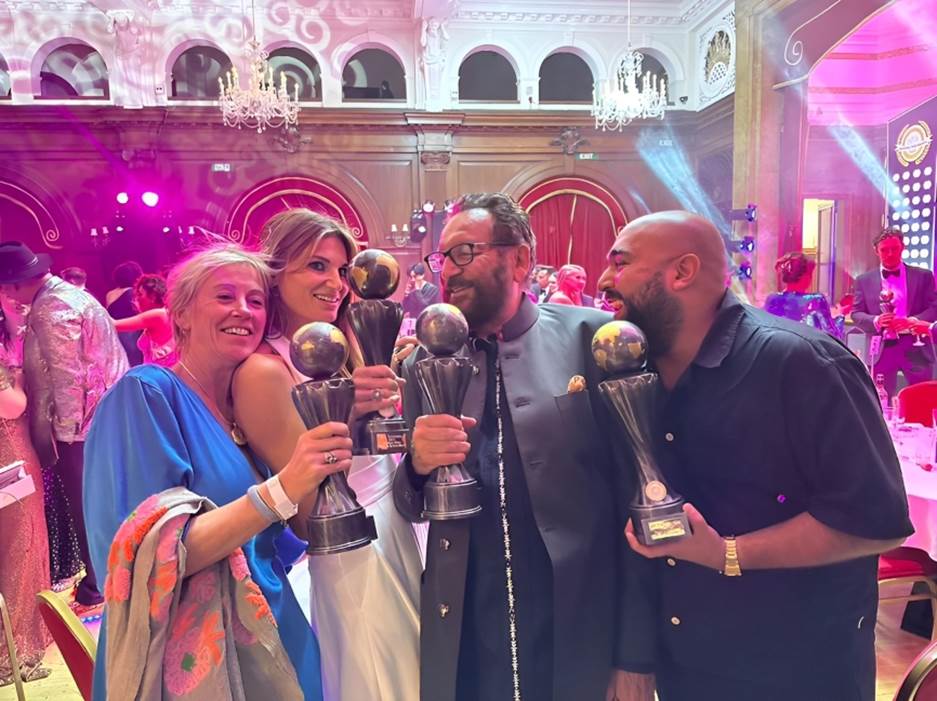
Jemima's 'What's Love Got to Do with It?' Wins Big at UK Awards
Writer and producer Jemima Goldsmith recently took to Twitter to express her elation as her film What's Love Got to Do with It? emerged victorious at the prestigious National Film Awards in the UK. The romantic comedy, directed by the illustrious Shekhar Kapur, received recognition in four categories, solidifying its status as a cinematic gem.
Taking to Twitter, Jemima wrote, "No one likes a show-off. But...we won four awards for our film last night and I felt so grateful and happy." Listing the triumphs, Jemima highlighted that the film won Best Screenplay, Best British Film, Best Director, and Best Supporting Actor." Capping off her tweet, Jemima said, "Thank you and well done to the entire team."
The acclaimed film has already garnered significant recognition. It boasts an impressive ensemble cast featuring Sajal Aly, Shazad Latif, Shabana Azmi, and Emma Thompson, with renowned music maestro Rahat Fateh Ali Khan making a special guest appearance. The film had bagged nominations in nine categories. The multifaceted nature of love and marriage across different cultures in the film has captivated audiences and critics alike.
Jemima's knack for weaving a narrative together had earned her a nomination for Best Screenplay, highlighting her prowess as both a writer and producer. Among the major nominations received by What's Love Got to Do with It? were Best British Film, Best Director for Shekhar, Best Screenplay for Jemima and Best Actress for Lily James.
The film had also secured nominations for Best Supporting Actor for Asim Chaudhry, Best Supporting Actress for Emma Thompson, Best Independent Film, Best Comedy, and Best Producer for the collaborative efforts of Nicky Kentish Barnes, Tim Bevan, Eric Fellner, and Jemima herself.
The announcement of these nominations took place in May for the 9th edition of the National Film Awards, organized by the esteemed UK's National Film Academy. Upon the release of the nominations, social media platforms buzzed with congratulatory messages directed towards Shekhar. Notable figures, including Manoj Bajpayee, who had previously collaborated with Shekhar on the critically acclaimed film Bandit Queen in 1994, extended their warm wishes to the director.
Jemima's creative vision has clearly resonated with audiences, as the multiple nominations for What's Love Got to Do with It? attest. Her screenplay brilliantly navigates the complexities of love and marriage in a multicultural context, captivating viewers with its heartfelt storytelling and universal themes. Jemima’s production team, in collaboration with the talented cast and crew, has brought her vision to life with finesse and artistic integrity. – The Express Tribune
|
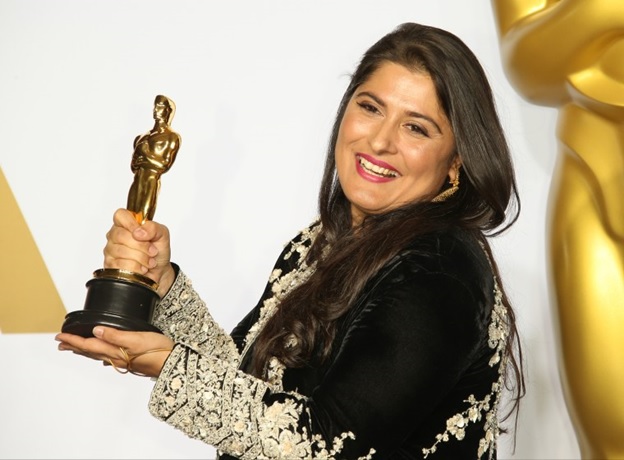
Sharmeen Obaid-Chinoy holds the Oscar for best documentary short subject for "A Girl in the River: The Price of Forgiveness" at the 2016 Academy Awards - Dan MacMedan/WireImage file
Sharmeen Obaid-Chinoy to Be the 1st Woman to Direct a 'Star Wars' Film
By Brahmjot Kaur
Sharmeen Obaid-Chinoy, an Academy Award-winning and International Emmy Award-winning director and journalist of Pakistan origin, will be the first person of color and the first woman to direct a “Star Wars” film.
She will direct one of the three upcoming films announced Friday at Lucasfilm’s Star Wars Celebration Europe 2023. The film, which will be set after 2019’s “Star Wars: Rise of Skywalker,” will focus on Jedi Master Rey (Daisy Ridley) as she builds a new Jedi order.
Obaid-Chinoy, who is a Pakistani Canadian, shared her excitement about the role on Instagram.
“I’ve spent my life meeting real life heroes, who have overcome the most oppressive empires and battled impossible odds and that to me is the heart of Star Wars...which is why I was attracted to the promise of a new Jedi Order …And why I’m particularly excited about being immersed inside a Jedi Academy with a powerful Jedi Master,” she wrote.
It was also announced that directors James Mangold (“Indiana Jones”) and Dave Filoni (“The Mandalorian”) were tapped to direct the other upcoming films in the franchise.
“We’re thrilled to be working with some of the best and most passionate filmmakers on projects that will span the past, the present and the future,” Lucasfilm president Kathleen Kennedy said during the showcase about the production company’s projects.
Past directors for the franchise’s films include George Lucas, Irvin Kershner, Richard Marquand, J.J. Abrams, Gareth Edwards, Rian Johnson and Ron Howard.
Obaid-Chinoy, acclaimed for her work as a documentarian, also directed two episodes of Marvel’s hit superhero television series, “Ms Marvel.”
Obaid-Chinoy has several accolades for past projects. She took home the Oscar for best documentary short in 2012 for “Saving Face,” a film about a plastic surgeon who returns to Pakistan to provide surgeries to victims of acid attacks, and again in 2016 for “A Girl in the River: The Price of Forgiveness,” the story of a woman in Pakistan who was sentenced to death for falling in love.
She also won seven International Emmys, six in 2013 for “Saving Face,” and one in 2014 for best documentary with her episode, “Pakistan’s Taliban Generation,” in Channel 4’s investigative series “Dispatches.” - nbcnews
|
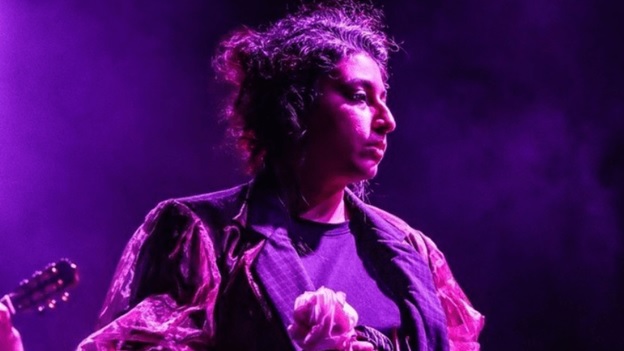
The singer will perform her nominated song 'Udhero Na' featuring Anoushka Shankar at the February 5 Grammys premiere ceremony – photo Arooj Aftab /Instagram
Arooj Aftab Will Be the First Pakistani Artist to Perform at the Grammys
Arooj Aftab was the first Pakistani to bag a Grammy and now she will be the first to perform at the award show. Her achievements keep multiplying and we couldn’t be more proud.
On Friday, Aftab took to Instagram and announced that she will be performing at the Grammys premiere ceremony, which is held hours before the main Grammys award show. Several awards are also announced at the premiere ceremony. “I simply cannot wait to play my Grammy nominated jam ‘Udhero Na’ feat Anoushka Shankar with her live, for you at the Grammys,” she wrote.
She added that her followers can catch her live on live.grammy.com and the Recording Academy’s YouTube channel on Feb 5 at 12:30pm Pacific Time.
“Let’s do this” commented Shankar while designer HSY called it “amazing” and Tara Mahmood said it’s “fabulous news”. Never Have I Ever’s Richa Moorjani and American singer Jessica Betts also commented on Aftab’s post.
Bad Bunny, Mary J. Blige, Brandi Carlile, Luke Combs, Steve Lacy, Lizzo, Kim Petras and Sam Smith will also be performing at this year’s Grammys .
This year, Aftab’s ‘Udhero Na’ has been nominated in the Best Global Music Performance category. Matt B and Eddy Kenzo’s ‘Gimme Love’, Burna Boy’s ‘Last Last’, Rocky Dawuni and Blvk H3ro’s ‘Neva Bow Down’ and Wouter Kellerman, Zakes Bantwini and Nomcebo Zikode’s ‘Bayethe’ have also been nominated in the same category.
Pop superstar Beyonce leads the field of musicians nominated for Grammy awards, setting up a showdown with Adele, Harry Styles and others for the top prize of Album Of The Year. The ‘Alien Superstar’ singer landed nine nominations for the highest honors in music. That brings her career total to 88, tying her with husband Jay-Z as the most nominated artist in Grammy history. – Courtesy Images
|
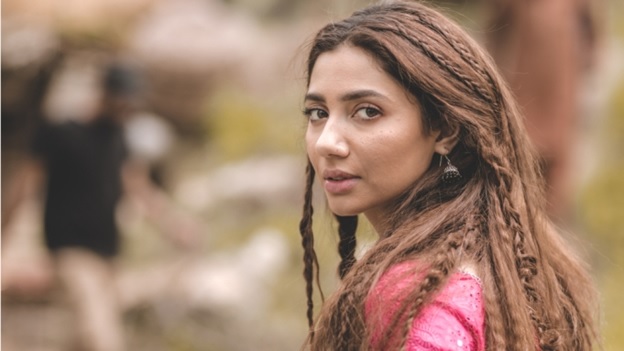
Variety
Mahira Khan, Filmmakers on Success of Pakistan’s All-Time Box Office Champion The Legend of Maula Jatt
By Naman Ramachandran
Bilal Lashari’s “ The Legend of Maula Jatt ,” starring Pakistani superstars Fawad Khan and Mahira Khan (no relation), is now officially the highest grossing Pakistani film of all time.
Produced by Ammara Hikmat’s Encyclomedia and Lashari Films, the film released on Oct 13, 2022 and has had worldwide collections of $10 million, including $4.2 million in Pakistan . It has far surpassed the $3.2 million grossed globally by previous record holder “Jawani Phir Nahi Ani 2” in 2018.
After Pakistan, the most successful territory for the film has been the UK, where it is distributed by Pranab Kapadia of Moviegoers Entertainment. It has collected £1.43 million ($1.7 million) in the territory, going past 2018’s “Sanju” that took $1.6 million, making it the highest grossing South Asian film there since “Padmaavat,” which grossed $2.5 million, also in 2018. The next highest 2022 grosser from South Asia in the UK is “Ponniyin Selvan-1” with $1.5 million.
The Punjabi-language “The Legend of Maula Jatt” is a reboot of Yunus Malik’s 1979 cult classic “Maula Jatt.” The cast for the film, which is one of the biggest budgeted in the history of Pakistani cinema, also includes Hamza Ali Abbasi, Humaima Malik, Faris Shafi and Gohar Rasheed. The film focuses on the legendary rivalry between local hero Maula Jatt (Fawad Khan) and Noori Natt (Hamza Ali Abbasi), the leader of a brutal gang. Mahira Khan plays Mukkho, a fiery village woman who is Maula Jatt’s romantic interest.
Mahira Khan, who was previously a VJ with MTV Pakistan and starred in hit series “Humsafar” (2011), has had a string of Pakistani film hits including “Bol” (2011), “Bin Roye” (2015), “Ho Mann Jahaan” (2015), “7 Din Mohabbat In” (2018), “Superstar” (2019) and “Quaid-i-Azam Zindabad” (2022).
“The biggest thing that Mukkho had was that she was just such an empowered woman – she loved fearlessly, her moral compass was so intact, she had integrity and she was fierce also,” Khan told Variety. “That was a very big thing that the women in this, in today’s ‘Maula Jatt,’ are very empowered. And I think this is something that a lot of people asked me prior to the release that ‘Are we going to see the same 1970s representation of women? I said, no, you’re going to see Bilal Lashari’s representation of women.’ I’m glad to have been a part of it.”
Khan says that the globally positive reaction to the film was unexpected and that it is the “quintessential reaction” to a good film. The actor’s feelings are shared by her producer and director.
“What a fantastic journey our film has had since its release. The love and appreciation from audiences has made this 10-year ride worth every moment. It is heartening to see people embrace regional cinema across the globe. I hope the success of ‘The Legend of Maula Jatt’ will pave the way for stories from Pakistan for a worldwide audience,” Lashari told Variety.
Hikmat added: “Getting noticed outside Punjabi cinema’s area of influence has been remarkable for the film. It would be an understatement if I say that the attention film received, came as a surprise. Yet it felt quite surreal when it got the appreciation and box office success everyone involved in the film had always dreamt of.”
“The Legend of Maula Jatt” is now looking at releasing in Turkey and China. Its global success comes at a time when another Pakistani film, Saim Said’s “Joyland” is winning accolades, beginning with an award-winning debut at Cannes to earning a place on the Oscars’ international feature shortlist and after some hiccups , released at home in Pakistan .
“Whether it’s ‘Joyland,’ whether it’s ‘Maula Jatt,’ the people at the helm of these projects are passionate. They have stories to tell, and they are visionaries,” said Khan. “We need more directors, more storytellers, who are telling stories from the heart. The other thing we really, really need is that I would like to see our government supporting our industry. And this year, we saw that happen.” Earlier this year, the Pakistani government recognized films as an industry, announced a film fund and major tax exemptions.
“The cinemas will be opening up and films like ‘Maula Jatt’ have doubled, tripled, quadrupled the footfalls, which weren’t coming in. These may be small, little steps, but they are eventually going to be really, really, big steps,” Khan said. “Netflix and Amazon – I believe they need to come in now because we have amazing content. But before that happens, we can actually put out as many films as possible, even the smaller ones. We don’t have a digital outlet yet. So, we can still do that business and we can still put out those smaller films.”
Khan has turned producer alongside Nina Kashif via their Soul Fry Films with “Aik Hai Nigar,” a TV film based on the Pakistan Army’s General Nigar, the first Muslim female army General in South Asia; and cricket-themed series “Baarwan Khiladi.”
Next up for Khan as an actor is “Neelofar,” a love story where she plays a blind woman, which reunites her with her “The Legend of Maula Jatt” co-star Fawad Khan, who also produces.
Like Fawad Khan, who had a successful career across the border in India, in Bollywood, Mahira Khan also tasted success with “Raees” (2017) alongside superstar Shah Rukh Khan. However, rising political tensions between India and Pakistan led to Pakistani actors and musicians being banned from working in India.
“I had the most amazing time working in India. I am still in touch with so many people and there’s a lot of love there. Unfortunately, we are easy targets, soft targets, whether it’s us here in Pakistan, whether it’s them there in India,” said Mahira Khan. “Because we’re artists, and we’re connected by that thread of art, we actually get each other. So, we’re trying to look out for each other, more than anything. Even now, we are so careful with what we write on social media. It’s not that we don’t talk to each other. It’s not that we don’t wish each other on our birthdays. It’s not that we don’t meet each other in different countries. It’s not that – it’s just that we are actually not just protecting ourselves but protecting each other.”
“Unfortunately, it’s politics, it’s not a personal thing. On both ends, until the time that scapegoats are needed, we will always be that,” Khan added. “But let’s say that it gets better. Let’s say that there is someone in power who does not use us as easy targets. That would be lovely. Can you just imagine the collaboration? It would be lovely.”
Mahira Khan is exclusively represented by Hamid Hussain and Muhammad Yaqoob at Action Consultancy. – Variety
|
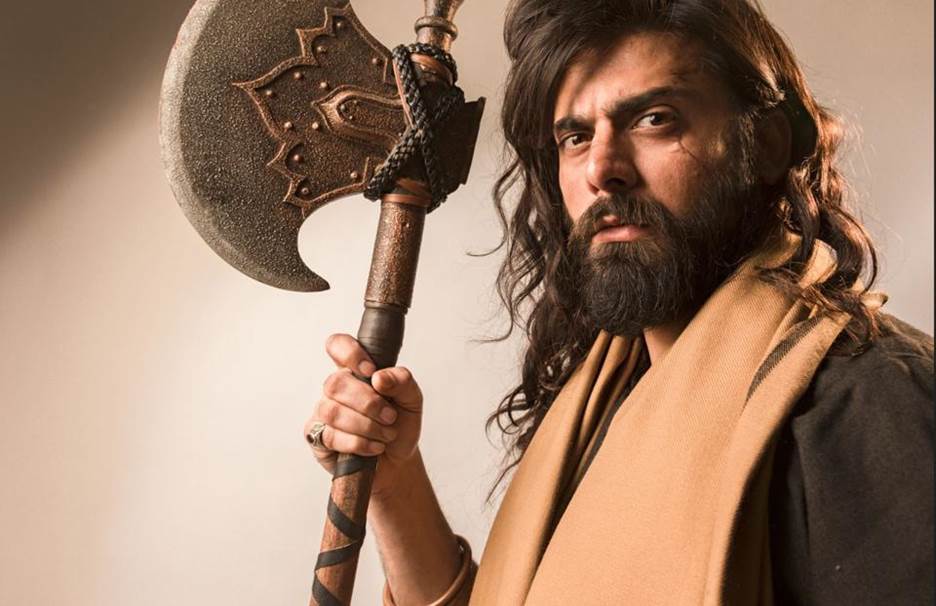
Forbes
‘The Legend of Maula Jatt’: Pakistani Epic Sets Global Opening Weekend Record
By Nancy Tartaglione
A reboot of the 1979 cult Punjabi classic, Maula Jat, Bilal Lashari ’s The Legend of Maula Jatt is coming off of a record-breaking weekend for a Pakistan-made or Punjabi-language film. Opening on over 500 screens in 25 markets, the action fantasy grossed PRK 51cr ($2.3M) globally, a new benchmark launch for a Pakistani title worldwide.
The movie (which The Guardian called Game of Thrones meets Gladiator) follows the titular Maula Jatt, a fierce prizefighter with a tortured past who seeks vengeance against his arch nemesis Noori Natt, the most feared warrior in the land of Punjab. Loyalties are challenged and families torn apart in an epic tale of truth, honor and justice. Fawad Khan (who appeared in Disney Plus series Ms Marvel), Mahira Khan, Hamza Ali Abassi and Humaima Malik star. Brian Adler ( Avatar: The Way of Water, Avengers: Endgame) served as VFX supervisor.
From Encyclomedia and Lashari Films in association with AAA Motion Pictures, and overseas distributor Moviegoers Entertainment, this is said to be the largest-mounted Pakistan-made, Punjabi-language film to date.
In Pakistan, it took $517K, and in the UK picked up $355K from 79 locations. The latter is the highest opening weekend for any Pakistani or Punjabi film in the market where it entered at No. 9 on the chart.
In the US, The Legend of Maula Jatt grossed $290K and in Canada $235K, kicking off at No. 6. The UAE saw a No. 1 start with over $515K. In Australia, it opened at No. 6 with $160K. Other releasing markets included Norway, Germany, Netherlands, Spain and South East Asia.
The filmmakers tell us demand has been extraordinary with exhibitors adding screenings throughout the weekend and into the week.
Lashari — who directed, co-wrote, lensed, edited and produced the movie — enthused, “I’m beyond overwhelmed by the love the film has received from audiences and critics alike the world over. We are so proud that The Legend of Maula Jatt has been instrumental in putting Pakistan-made cinema on the global map as it continues to win over hearts in theaters across the world.”
Producer Ammara Hikmat said, “ The Legend of Maula Jatt has been our labor of love for a number of years. The pandemic came and returned but we knew we had to hold out for a theatrical release, as the film is undoubtedly a big screen experience… We’re so delighted that our film has broken previous records and set a new benchmark for Pakistan-made cinema, loved and lauded not only domestically but by audiences and critics globally.”
The Legend of Maula Jatt started rollout on October 13. Mandviwalla Entertainment with Geo Films releases in Pakistan; and Moviegoers Entertainment in overseas markets. – Deadline
|
'London Nahi Jaunga' Is a Thoroughly Entertaining Apology by Khalil Ur Rehman Qamar
By Rafay Mahmood
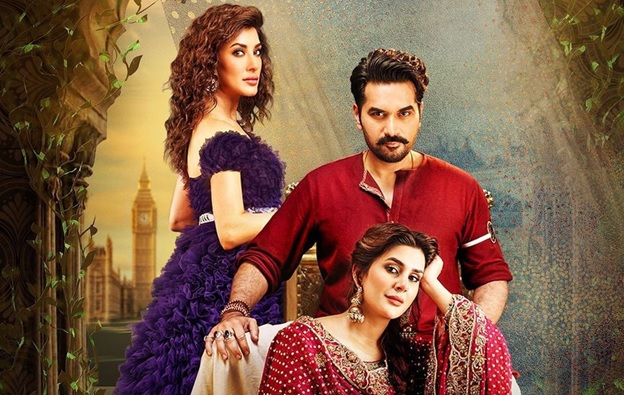
Danabad village in District Faislabad is associated with the folk tale of Mirza Sahiban, the epic story of a woman who elopes with her lover Mirza, but her heart still beats for her brothers. Mirza waits under a jand tree, he doesn’t want to enter the village right away because her sister is being wed at the same time. Sahiban is with him. She fears that the angry Mirza is going to kill her brothers out of anger so she twists his bow and breaks the arrow. Her brothers arrive not with blessings for her sister but with fury, a helpless Mirza is stabbed to death by the brothers and so is the sister.
Hasan Miraj in his book Rail Ki Seeti writes that following Sahiban’s sacrifice, one woman in every generation of Siyals ends up falling in love and dying for it at the peak of her youth. “On the other side of the rail track, in Jhang, the same story is associated with Heer.”
While some see this as a story of a woman’s commitment to what she always wanted, others view it as a woman being reduced to her love life. Centuries later, a ‘more woke’ and softer film inspired by similar stories has the Pakistani box office on fire. Written by the ever-so-controversial Khalil ur Rehman Qamar and directed by Nadeem Baig, London Nahi Jaunga grounds itself into the rich folk heritage of Punjab and reproduces a story with similar characters and tropes but with a loud, and at times, forced feminist hot-take on everything.
Chaudhary Jameel Qamar (Humayun Saeed) is a burly, soft-hearted successor to Chaudhary Kafeel (Sohail Ahmed). He is into dog racing and poetry and is equally bad at both, in fact, much worse at poetry, which somehow forms the climax of the film. The Qamar surname and TikTok-friendly poetry give the impression that Humayun plays if not Qamar, then the writer’s projection of himself on the big screen. “Muhabbat science hoti hai, Becharna art hota hai.” So grand. Wow. Tehzeeb Hafi has a new competitor in the field.
Jameel’s Japan-imported dog loses to a dog from Pattoki and so, he ends up fulfilling his promise of getting hitched to a girl – Arzoo (Kubra Khan) – who has always wanted to marry him. Zara Mansoor (Mehwish Hayat), a girl dressed in tights, randomly crashes their engagement ceremony and asks for a tour of their historic mansion. Enamored by her beauty, Jameel stalls everything to give her a tour, to which no one objects. And then when he finally comes back to the ceremony, Arzu collapses in front of the crowd and the engagement gets postponed indefinitely.
Spoiler Alert!
It is revealed that Zara is the daughter of Jameel’s aunt (Saba Hameed), who, along with her lover, (surname Jami), was killed by the Tiwanas for marrying against their will. Turns out, her mother who was pregnant at that time, somehow survived and so did the baby, and they are now settled in London. We are not told what stroke of luck made them so fortunate overnight, but the film overrides this loophole so swiftly and holds the rest of the story together so firmly that you aren’t bothered by the glitch, which could have otherwise been a blunder.
An extended apology by KRQ
Zara has come back to avenge her father’s death and alter the cycle of oppression that was unfair to her mother, all the while offering a public apology to feminists on behalf of KRQ. Trust me, it almost feels like if it was up to Qamar, he would have made the women in the film burn his own effigy and stomp over it with a happy Rahat song playing in the background. But thankfully, it doesn’t come to that. He seems to have corrected all the flaws and ‘misunderstandings’ regarding his rash and misogynistic public statements. Or else, how would he have convinced Meesha Shafi to sing a song written by KRQ in a film written by KRQ, and her mother, Saba Hameed and Iffat Omar, to play some of the most important roles in the same film.
Perhaps a dialogue has taken place behind the scenes and that dialogue is clearly rendered fruitful for the audience, given the short but spectacular performance by Hameed.
The film is so full of statements about gender equality that Mehiwsh Hayat even joins Humayun to fight equally in an action sequence in which he is supposed to save her from the goons. There are references and one-liners that make a case for a woman’s agency and accuse men of making everything related to women a matter of their honor and pagh (read, respect). He even uses the metaphor of using imported phones instead of manufacturing our own in order to justify why our ‘ghairat’ doesn’t matter where it needs to matter.
The father admits to his son becoming a feminist and how he has forfeited his army of ‘ghairat’ in front of his son’s reasoning and logic. Yes, it seems like an OD of sorts but then KRQ needed not just a miracle, but a series of them to absolve him of his sins.
Incredible performances and casting
Humayun Saeed doesn’t have a huge range as an actor which is why he gets people to write roles that seem tailor-made for him. Chaudhary Jameel is no different. It offers the actor enough poker-face moments to ace his performance as a confused Punjabi Romeo and relies mostly on his silence, and if needed, short but steady monologues that don’t rely on a loud build-up in the crescendo. The role keeps Humayun in his comfort zone and he takes you for a good ride. Save for the Punjabi dance number at a London wedding, which neither had a memorable melody nor served any purpose in driving the plot forward.
Kubra Khan was the real surprise package. It was fascinating to see Kubra, who is otherwise known for her British accent, sport an educated girl from rural Punjab. In her limited but significant screen-time, she ruled the screen and camera, equally! The same was the case with Vasay Chaudhry, who plays Harry. While we are so used to seeing him as a host responding to juggats on TV, his role as Zara’s best friend in London grows on you and you are ready to buy his occasional goofiness and presence as a friend who isn’t charming but is always there.
If the film will be remembered as yet another successful box office venture by Humayun it will also be remembered for gifting Gohar Rasheed the role and stature he always deserved. He plays Jameel’s sidekick with the comfort and agility of an actor who has over the years, carved himself into a tool for the directors to play with. And not many in the new crop of performers have the capability to do that, let alone, doing that without meeting the conventional standards of good looks. It was good to not see Nayyar Ejaz in a Pakistani film and see Asif Raza Mir fill in for a Pir who dominated the film while sitting on a chair throughout.
There’s something special about the close-ups of the old guard of actors. Go see the film and tell me why are they so particularly arresting?
All in All
In the end, I have a confession to make. I haven’t watched Punjab Nahi Jaaongi and the reason why I mentioned it at the end is that you are going to enjoy the sister film regardless of having watched the previous one. London Nahi Jaunga has memorable one-liners and a consistent storyline that fills most of the gaps but it takes a lot of time to do that. The intermission could have easily arrived at the peak confrontation between Jameel and Zara and the film could have easily ended at least 30 minutes shy and left an equally satisfying and a lot less exhausting aftertaste.
All in all, the film is one of the finest offerings by Pakistani cinema that is going to earn even better numbers at the international box office. And for it to be rooted in and inspired by Punjab’s folk heritage is going to be a major factor in placing Pakistani cinema as an extension of Bollywood which is, frankly speaking, a good thing.
This also reminds me of writing about ‘Ghabrana Nahi Hai’ and why it felt that Pakistani cinema can’t compete with Bollywood because good storytelling comes from a place of rich, textured mythology, not a place where stunted ideas are repeated and retold with renewed vigor and a reimagined sense of morality.
KRQ’s biggest achievement is the seamlessness with which he has taken elements of Punjabi folk heritage, stories we have heard again and again, and merged them with something as relatable as a property dispute and then garnished it with enough masala and ‘discourse’ for people to chew on. Kudos to both Baig and KRQ for picking the script and with it, tapping into a range of archetypes that seem familiar and fresh at the same time.
Context not trivia
Having said that, author Miraj says that while women dying for love is very much a motif of Punjabi folktales, in Punjabi folktales, women are mostly scoffed at as emotionally charged and rationally weak beings who are easily impressionable. “So, I’d say the girl coming back to avenge her parent’s love story can be called a good spin on existing folk characters like Sahiban and countless others, but it isn’t entirely honest to how women are seen and shown in Punjabi’s folktales,” he says.
“It’s actually Bhittai’s heroines that are included in the Sindhi folk heritage that have tremendous agency and power and are very much the drivers of their own destiny,” he says. – The Express Tribune
Courtesy The Express Tribune
|
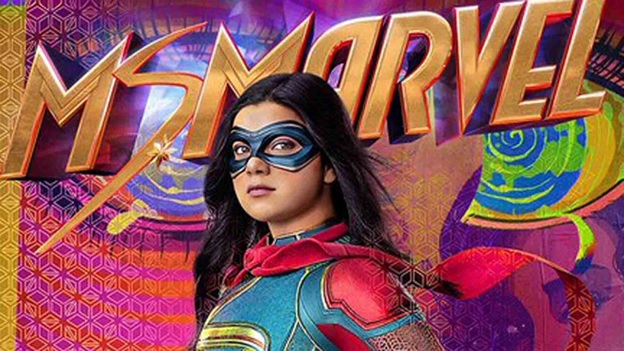
marca.com
Ms Marvel's Desi Moments Reflect the Story of Every Brown Teenage Woman and I Love It
By Marsha Tayyab
When I first saw the trailer for Ms Marvel I wondered what irked many netizens about the desi representation or lack thereof. After watching the first episode I can confirm that the netizens were needlessly worried — the show has some major nods to the same desi upbringing we all had, from strict curfews, restrictions on how we dress or asking permission for everywhere we wanted to go. Ms Marvel is the story of a Muslim teenager who is living her dream and dealing with life at home, just like us.
The show starts off with Kamala saying "finally the moment everyone has been waiting for" as if the soon to be superhero knows very well how long the desi community, especially Pakistanis, have been waiting for her.
Kamala is, of course, the main character of Ms Marvel , but for me, the hyper desi moments were the stars of the show. Here are some moments I loved.
Bismillahs and Astaghfirullahs
In most Pakistani homes, there's going to be a person who will remind you to start everything you do with a Bismillah. Such is the case for Kamala when her brother asks her to make a small prayer before her driving test.
And how can a show about a Pakistani household not include a parent shaking their head in disappointment and saying Astaghfirullah when they don't like something? Kamala's parents uttered a couple of Astaghfirullahs over her obsession with Captain Marvel and some haram policing also made it to the episode when Kamala asked her mom Muneeba's (Zenobia Shroff) permission to go out.
A 'secret' language
The most desi thing I can imagine is using Urdu as a secret language in a country full of non-desis. Kamala's mom did just that when she mocked her driving instructor in Urdu in the opening scene.
In watching Muneeba let a " kaminey " slip out, I realized we all essentially have the same moms who revert to their mother tongues when greatly annoyed. A point to Ms Marvel for recognizing and representing that!
Kamala vs Ahmed, the story of every sister and brother
Kamala has a brother, Ahmed, and in every desi household, women are compared to their brothers. It looks like we're all in the same boat.
In the show, Kamala is seen preparing for her brother's wedding but at the same time she struggles to escape her parents scrutinizing her every move. When not given permission to go somewhere, she drags her brother in and compares how he easily gets his way.
The episode also featured Ahmed asking Kamala to unpack the groceries after their mother asked him to do it. This is the story of every desi brother and sister and seeing it represented in Ms Marvel made it feel even more real.
Desi parents and their obsession with shalwar kameez
Of course , Kamala had to have a shalwar kameez moment in the very first episode of the show. After she goes to great lengths to impress her parents and get permission to go to Avengers Con, Kamala's parents come up with a solution — Hulk-themed shalwar kameez. Her father was comically dressed in matching Hulk attire — a green kurta with bright purple details.
The emphasis on wearing shalwar kameez was familiar because I'm sure there are many other women like me who feel pressured to dress a certain way because of our parents. In that moment, I felt even more connected to Kamala as she sighed in disappointment over her parents' shenanigans.
Desi music reigns supreme
While I liked 'Blinding Lights' by The Weeknd as the main track, the first episode didn't let me down when it came to the desi music it had to offer. Kamala entered school to an upbeat song that turned out to be Riz Ahmed's 'Deal With It' .
The first episode featured 'Oh Nanba' from Rajinikanth's Tamil film Lingaa , Ahmed Rushdi's 'Ko Ko Korina' , Pakistani film Babul Veer's song 'Sohniye I Love You' by Naheed Akhtar and 'Rozi' by Eva B and I loved every second of it.
Who is Kamala Khan?
In the show, actor Iman Vellani plays 16-year-old Kamala, a Pakistani-American teenager who lives in Jersey City. Kamala is an aspiring artist, an avid gamer, and a voracious fan-fiction scribe. She is also a huge fan of the Avengers — and one in particular, Captain Marvel. But Kamala has always struggled to find her place in the world — that is until she gets super powers like the heroes she’s always looked up to.
Ms Marvel is being helmed by Oscar-winning Pakistani filmmaker Sharmeen Obaid-Chinoy, Meera Menon, Adil El Arbi and Bilall Fallah. While it premiered on Disney+ on Wednesday, Marvel Studios will be releasing Ms. Marvel exclusively in cinemas in Pakistan next week. Episodes one and two will debut on June 16, three and four on June 30 and five and six on July 14.
The cast includes Aramis Knight, Matt Lintz, Saagar Shaikh, Rish Shah, Mohan Kapoor, Farhan Akhtar , Nimra Bucha, Mehwish Hayat, Samina Ahmed , Shroff, Yasmeen Fletcher, Travina Springer, Laurel Marsden, Laith Nakli, Azhra Usman and Fawad Khan . - Images
|
Lata Mangeshkar, Her Art, and Karachi
By Peerzada Salman
Karachi, Pakistan
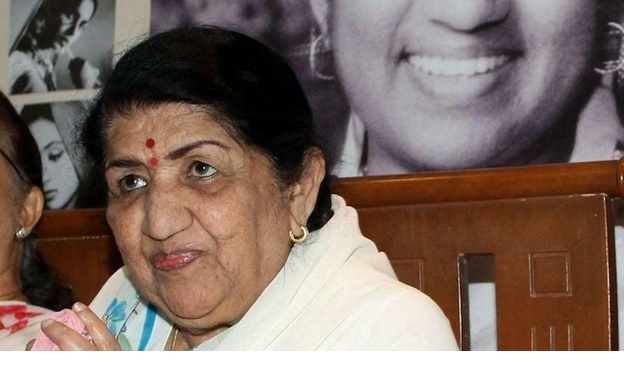
If you've travelled on public transport in the city, chances are the iconic singer's songs have accompanied you on your journey.
As long as I can remember, I’ve been listening to Lata Mangeshkar’s songs. As a child, when I didn’t take music as a serious discipline and considered it a fun pastime, her voice sounded soft and balmy — most children love that — accompanied by a sense of rhythm that enables you to realize that nothing significant in life is devoid of rhythm (love, struggle, playfulness etc.).
When I grew up, and as I developed a modicum of understanding of the art of music, I was totally mesmerized by her voice — the voice that could effortlessly express a plethora of emotions.
She sang romantic songs with the spunk of a free-spirited school-going girl, crooned sad tunes with the kind of melancholic broodiness that one associates with Keats’s poetry and belted out peppy tracks with happy-go-lucky abandon. But these are attributes that any connoisseur of music can talk about. What was it that made Lata so special, a vocalist in a league of her own?
Karachi’s bus commuters in the 1980s and to a good part of the ‘90s would remember that a majority of the vehicles had stereo systems that played Indian and Pakistani film songs, mostly the former, making commuting a less cumbersome experience.
Without an iota of doubt, it was Lata’s songs, to a great extent along with Mohammad Rafi’s, which outran those sung by other great playback singers such as Kishore Kumar, Asha Bhosle (her younger sister) and Mukesh. It was Lata’s flawless, unwavering pitching coupled with unsullied, mellifluous voice that put her audience into a trance. She had this uncanny knack of being in sur even when she wasn’t feeling a hundred per cent. She would never leave the last note of a mukhda (the opening verse) or asthai (the middle verse) a quarter short or lingering at the end. She would always be in sur, utterly immersed in the composition.
There are countless examples to prove this point since Lata has thousands of songs to her credit, in multiple languages at that. But a case in point could be ‘Nadiya kinarey’ from the movie Abhimaan or ‘Raina beeti jaye’ from Amar Prem composed by the incomparable S. D. Burman who made Lata lend her voice to some memorable soundtracks.
However, the two songs that Karachiites who travelled by bus number 5C or the famous omnibus W-11 heard on repeat and would also be often blaring from their homes after dusk were ‘Zihal-i-miskeen’, a duet with Shabbir Kumar, and ‘Ik piyar ka naghma hai’ — both compositions of Laxmikant-Piyarelal from the films Ghulami and Shor, respectively. They are memorable tunes made immortal by her exceptional singing.
Like a genuine artist who knew what music meant for the whole world, Lata had no qualms in admiring her contemporaries (Noor Jehan, for example) or seniors (K L Saigol, etc.). Her profuse, oft-quoted praise for Mehdi Hasan Sahib is no secret.
But in 2016, Lata made an unknown Karachiite hog the spotlight. Someone put up a video clip of a man from Karachi called Master Aslam on social media singing ‘Yaad piya ki a’aey’— the iconic thumri. Lata, who was a Facebook user (her staff must have managed it), put that bit on her Facebook page, inquiring who that talented man was (guni kalakaar). Her gesture catapulted Master Aslam to national fame.
Imagine, an artist of such a stature acknowledging the art of an unrecognized individual! How often does that happen in our part of the world?
Lata was a vocalist to whom no epithet can do justice nor any article can fully encapsulate the extraordinary ability she had of owning the songs written and composed for her by others. It’s her unadulterated voice, masterful singing, and her instinctive understanding of how consonants and vowels should be used to extract the maximum feeling out of them that will keep helping listeners of music in all parts of the world to find beauty around them and pull through trying times. – Courtesy Dawn
|
Upcoming Telefilm Pyaas Will Offer Insight into Water Scarcity
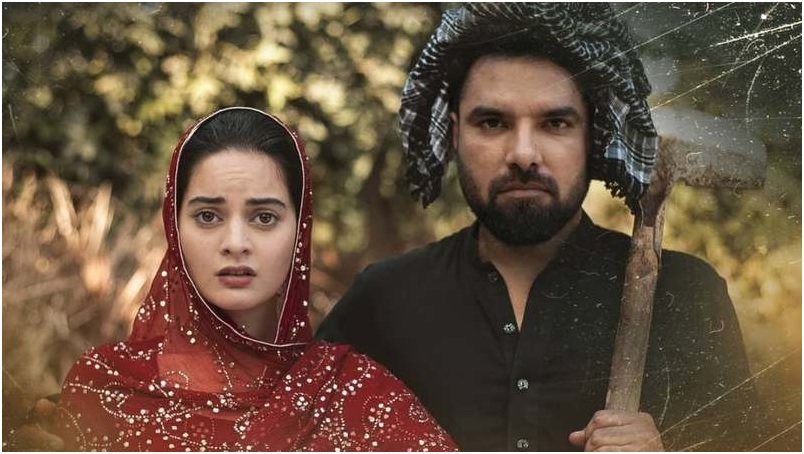
Vital to all known forms of life, water is a necessity but privilege for some. What happens when its scarcity affects families and struggling women in rural areas? Minal Khan and Yasir Hussain's upcoming telefilm Pyaas is about to delve into just that.
The telefilm produced by FadiaWajahat is the duo's latest project. Speaking about her experience, Khan took to social media to share some insights into the story, grateful for the opportunity.
"Shameem is a window for me to look into the life of underprivileged women of KohalaPaien, Haripur who walk through many miles to fetch water for their daily use," said Minal, as she revealed glimpses into some behind-the-scenes on set, talking about her experience.
"Portraying a girl who goes through all this was really a lifetime experience for me. We consume water daily but don't realize how precious it could be, for someone living nearby."
Pyaas is by Syed Wajahat Hussain, renowned director and producer popularly known for his works Do Bol and Yaarian, who aims to shed light on important issues of survival through a number of plays and short films.
"Good luck, Wajahatbhai and thank you for giving me a challenging character. I am available in all my capacity for any such opportunity next time too," the Jalan actor posted, expressing her willingness to work on similar exciting projects in the future.
Previously, Hussain too, had shared teasers of the telefilm, starring Adnan Shah Tipu and Madiha Rizvi in supporting roles.– Images
|
‘Saat Din Muhabbat In’ Is a Two-Hour Fairytale
Review by Rafiq Ebrahim
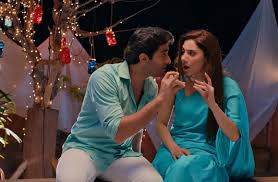
After the so-called revival of Lollywood, movies that are produced give surprises of one kind or the other. Very few films come under the category of ‘good and enjoyable’.
Saat Din MuhabbatIn is also a big surprise. The auAudience, hopeful of getting a pack of humor and wishing to see their favorite Mahira Khan in all her glory, gets a dose of fantasy as soon as Dwarka Prasad, a jinn from Delhi played by Javed Sheikh makes his entry. He comes in various forms and shapes, challenging young men to fulfill his challenge.
The hero, Tipu (ShehryarMunnawar) comes under his spell. He is asked to marry a girl with a mole on her face within seven days or be prepared to work as a laborer in the jinn’s underground den. Tipu flutters about, meeting several beautiful girls, including Amina Ilyas, a fashion model, but ignoring the love of his simple, charming cousin Neeli (Mahira Khan) living with him and a domineering angry fat aunt (HinaDilpazeer). The aunt wants to get rid of Neeli and arranges her marriage with a tough gangster, Kankatta, who already has two wives.
The movie rolls on and we get humor from the hero, Kankatta and a few more characters, but the humor is loud, except from the performance of Tipu. The jinn keeps on coming again and again reminding Tipu that time is passing by – fulfill the challenge or be a hard laborer. On the last day he realizes that he is actually in love with Neeli. He transforms himself from zero to hero, fights Kankatta while his marriage to Neeli is about to take place. Tipu and Neeli then try to beat the jinn, but the mole on her face is not visible. It is on her neck, and hence the couple overpower the jinn who has miscalculated the time difference between Delhi and Lahore. The jinn is reminded about it, who accepts his defeat and disappears in the form of a big cover of smoke.
This is what Saat Din MuhabbatIn is all about. If you like a fairytale this movie is for you. If you love credible humor, the movie is not for you. It could have been an interesting flick, if only some unnecessary sequences were deleted, like showing the jinn’s dungeon again, and again where sweaty laborers are beating heavy metals, and the last sequence which is too long for you to digest.
Among the artists, SheryarMunnawar has surprisingly given a good performance of a diffident young man turning into a strong character. He delivers his part of humor convincingly – certainly a good addition to heroes in Pakistani films and TV dramas. Another surprise is the performance of Mahira Khan, certainly not rising to the wishes of her admirers. She is rather in a subdued role, mostly wearing simple dresses and with a light make-up. Only in the end, she comes up to showing her real talent. Javed Sheikh and HinaDilpazeer have done what was expected of them, nothing extraordinary. Others have just filled the bill.
The direction is sleek, but not very imaginative. As said, with better editing, the movie would have qualified as a good entertainer. Music, as in most Pakistani films, is generally appealing.
Saat Din MuhabbatIn will be enjoyed by fantasy fans, and tolerated by others – not too bad, not too good. Two and a half stars.
(RafiqEbrahim is a freelance writer and novelist. He can be reached at rafiq.ebrahim@gmail.com )
|
|
|

